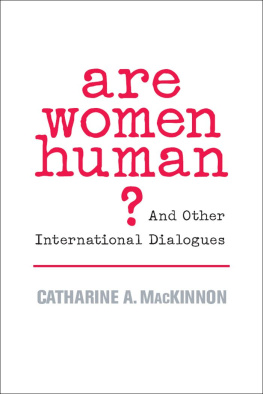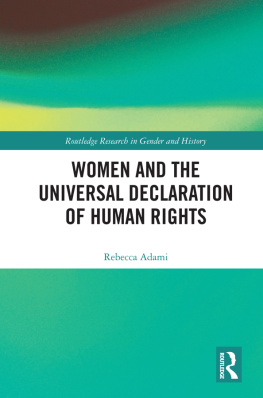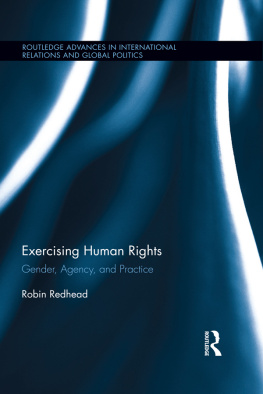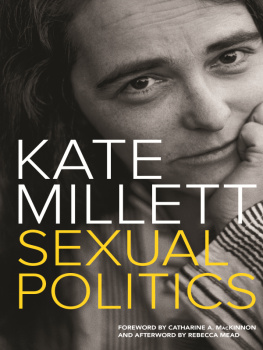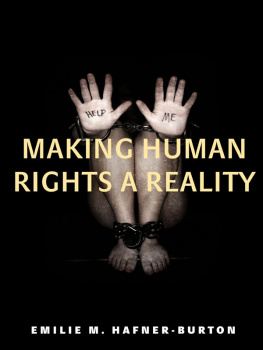are women human?
and other international dialogues
CATHARINE A. MacKINNON
are women human?
and other international dialogues
THE BELKNAP PRESS OF HARVARD UNIVERSITY PRESS
Cambridge, Massachusetts, and London, England
Copyright 2006 by Catharine A. MacKinnon
All rights reserved
Printed in the United States of America
First Harvard University press paperback edition, 2007
Library of Congress Cataloging-in-Publication Data
MacKinnon, Catharine A.
Are women human? : and other international dialogues / Catharine A. MacKinnon.
p. cm.
Includes index.
ISBN-13: 978-0-674-02187-7 (cloth : alk. paper)
ISBN-10: 0-674-02187-8 (cloth : alk. paper)
ISBN-13: 978-0-674-02555-4 (pbk.)
ISBN-10: 0-674-02555-5 (pbk.)
1. Women's rights. 2. WomenLegal status, laws, etc. 3. WomenViolence against. I. Title.
HQ1236.M337 2006
341.4858dc22 2005044747
for Asja Armanda and Jessica Neuwirth
Preface
In the mid-1980s, as the new Charter of Rights and Freedoms came into force, I began working for legal equality in Canada, largely with the Womens Legal Education and Action Fund (LEAF). The results diverged strikingly from those in the United States, stimulating comparative thoughts. In late 1991, right after Vukovar fell, Bosnian and Croatian womens request to work with them took my work international, as it has remained. The present volumeoriginally part of Womens Lives, Mens Laws (Harvard, 2005), now its transnational companioncollects selected comparative and international writings and speeches from this period.
The pieces, arranged in approximate chronological order within themes, appear here essentially as they were when originally spoken or written. The ideas develop over time, particularly in the Bosnian case. Most of these writings were first given as speeches, self-contained and free-standing, with the consequence that certain locutions or source texts recur, if in somewhat different form, throughout the collection. Footnotes alert the reader to situations that are now dramatically different from the way they are represented in the text. This happens fairly regularly, as these dialogues were often part of making changes in the world with which they are engaged.
Since 1990, the University of Michigan Law School, notably its unsur-passed Law Library, has given me the support and freedom to pursue my own path. As one place to follow it, the Center for Advanced Study in the Behavioral Sciences (CASBS) at Stanford, California, has been idyllic. These institutions put their resources where their principles are. Kent Harvey and Nancy Ruth have been there throughout. Charlotte Croson, John Stoltenberg, Lori Watson, Anna Baldwin, Emma Cheuse, and Shiri Regev, with a last minute assist from Shannon MacKinnon, shouldered with skill and humor, even heroism, the technical tasks that make a pile of manuscripts, transcripts, and offprints into a book. I am grateful to them all.
Special thanks go to Peter Nelson Rowe, my first international teacher; always to Robert Dahl, who never stops inspiring; to the late Andrea Dworkin, who insisted from the beginning that we ground our work against pornography in international law; to Christine Chinkin for the learning of joint teaching; to the Federation of Women Teachers Associations of Ontario (FWTAO) for its vision of womens genius and model of womens solidarity; to all the women of Equality Now, especially Jessica Neuwirth, for our years of work together; and to Natalie Nenadic and Asja Armanda and to my clients and colleagues from Bosnia-Herzegovina and Croatia, who gave me the world.
Catharine A. MacKinnon
Stanford, California
When writing the essay that became the title piece for this volume, I was not aware of Dorothy Sayerss work. See Dorothy L. Sayers, Unpopular Opinions: Twenty-one Essays (New York: William B. Eerdmans, 1971, 2005). The question deserves re-asking from diverse perspectives and Harcourt and Brace, 1947); Dorothy L. Sayers, Are Women Human? Astute and Witty Essays on the Role of Women in Society, Introduction by Mary McDermott Shideler (Grand Rapids, Mich.: in varied contexts.
Contents
They had been, if not social equals, homemakers and mothers with families and homes to care for, farmers with land and livestock, lawyers and judges in a legal system, workers with jobs in factories and businesses, schoolgirls whose mothers were alive and whole. These Bosnian Muslim, Bosnian Croat, and Croatian women and children survived the atrocities of Serbian extremist forces in Bosnia-Herzegovina and Croatia from 1991 to 1994 determined to stop the genocide, to hold the perpetrators accountable, and to change the way sexual violations are seen in society and treated in law.
Womens refusal to accept the double-edged denial of their humanitythe denial that sex-specific violations are commonly committed and that they are inhumanhas long been slowly shifting the form and content of the transnational human rights paradigm. Women, largely excluded from governments, have organized their own international nongovernmental organizations (NGOs) that have increasingly made grassroots civil society a factor to be reckoned with in international relations. Recognition that states
Earlier versions of some of the ideas in this introduction were published in the University of Michigan Law Schools Law Quadrangle Notes , FallWinter 1999, 3. They benefited from being presented to the European Court of Justice at a meeting held by the University of Michigan Law School at the Hay-Adams Hotel, Washington, D.C. (Apr. 19, 2000), and delivered as the Contemporary Civilization Coursewide Lecture at Columbia University titled Womens Worlds, Mens States (Apr. 29, 2004) and from the discussions that followed. Comments from Jessica Neuwirth, Lisa Cardyn, Jos Alvarez, and Tom Bender made it better. Exceptional technical assistance under pressure was provided by Anna Baldwin and Emma Cheuse and the University of Michigan Law Library. The University of Michigan Law School and a fellowship at the Center for Advanced Study in the Behavioral Sciences (CASBS) at Stanford supported its writing.
In the mid-1990s in particular, Bosnian women, while their communities were still being attacked by Serbian forces, spoke out about being raped en masse as an instrumentality of a genocide that was being conducted in part through war. The assault and their resistance to it challenged the lines between genocide and war and, ultimately, between war and peace. Steps toward establishing these features of what might be termed the womens model of human rightsnot because it is exclusive to one sex but because it is predicated on womens distinctive experiences of violation and of denial of that violationare beginning to make human rights an honest term.
Becoming human in both the legal and lived senses is a social, legal, and political process. But, in circular epistemic fashion, seeing what subordinated groups are distinctively deprived of, subjected to, and delegitimated by, requires first that they be real to power: that they first be seen as human.
Put another way, human rights can be observed to be a response to atrocity denied. Before atrocities are recognized as such, they are authoritatively regarded as either too extraordinary to be believable or too ordinary to be atrocious. If the events are socially considered unusual, the fact that they happened is denied in specific instances; if they are regarded as usual, the fact that they are violating is denied: if its happening, its not so bad, and if its really bad, it isnt happening. The given status of certain people is seen as tautologous with, even justified by, the deprivations of their human rights. Law often collaborates by making an unusual or extreme form of a common violation illegal, so that what is illegal almost never happens, yet the law appears to stand against the violation. Victims are thereby ideologically rendered appropriate to their treatment, the unequal treatment serving to confirm their ontological status as lesser humans. When nothing is done, the treatment, and social status accordingly, confirm and create who one is. Legally, one is less than human when ones violations do not violate the human rights that are recognized. Acts common in human experience, such as rape in war and rape in peace, have been beneath serious notice because they are so familiar, while acts that are uncommon, like the Nazis industrial murder and the Serbs industrial rape, have been beyond belief. While disbelief and associated impunity reign, the violated aresystemically and effectively speakingrendered not fully human legally or socially. When and where this denial is overcome and rights against the extreme and the normal are recognized, the treatment is defined as inhuman and the victims human. Women are in the midst of this process.
Next page
